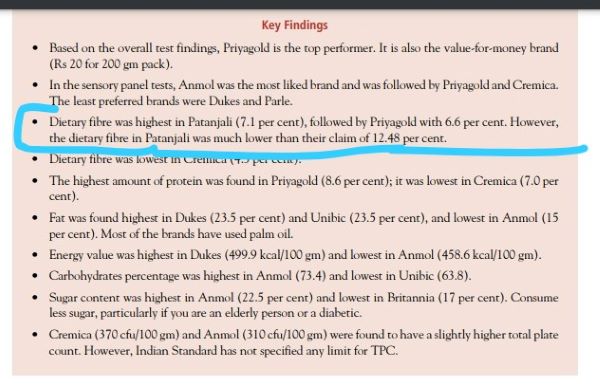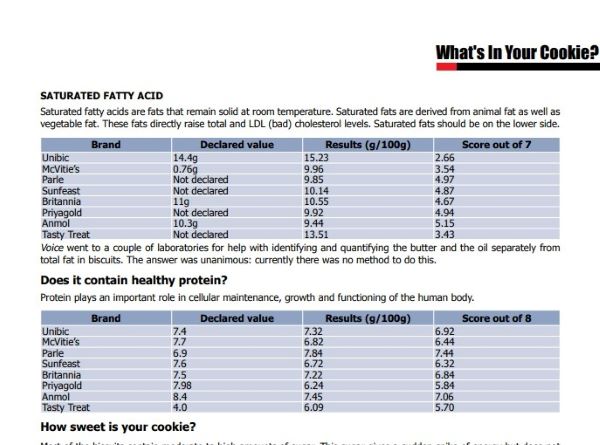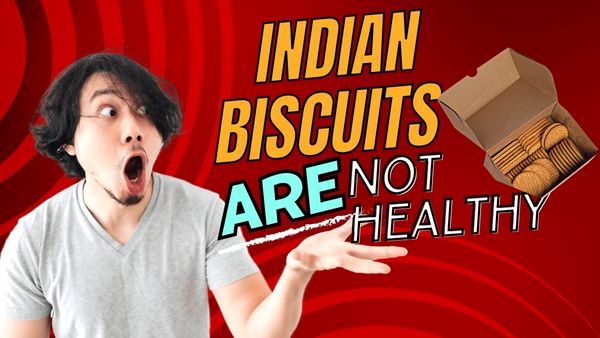Biscuits are a staple snack in Indian households, often marketed as healthy options with labels like “digestive,” “multigrain,” and “fiber-rich.” However, a closer look at the ingredients of these so-called healthy biscuits reveals a different story. No matter the claim – The truth is Indian biscuits are not healthy. Surprised? Well, this article explores the main ingredients of Indians biscuits and how the main ingredients can harm your health in various ways, giving you life-long diseases backed by research and case studies.
Types of Biscuits Available in the Indian Market
- Digestive Biscuits: Marketed as a healthier option, these biscuits claim to aid digestion and provide fiber.
- Multigrain Biscuits: Advertised as nutritious, these biscuits contain a mix of grains but often still include unhealthy additives.
- Cream-filled Biscuits: Popular among children, these are high in sugar and unhealthy fats.
- Glucose Biscuits: Often consumed as an energy booster, these are high in refined sugars.
- Marie Biscuits: Considered a light snack, these are still made with refined flour and sugar.
Analysis of Main Ingredients of Indian Biscuits
Maida (Refined Flour)
Maida is a highly processed flour stripped of most nutrients during the refining process. It has a high glycemic index, which means it can cause rapid spikes in blood sugar levels. A study published in the journal Nutrients indicates that high consumption of refined grains is linked to an increased risk of type 2 diabetes and cardiovascular diseases. (Source)
Sugar
Most Indian biscuits contain high amounts of sugar, which contributes to various health problems. Excessive sugar intake is linked to obesity, type 2 diabetes, and dental issues. (Source) The World Health Organization recommends limiting sugar intake to less than 10% of total daily calories to reduce the risk of these health issues.
Palm Oil
Palm oil is a common ingredient in biscuits due to its low cost and long shelf life. However, it is high in saturated fats, which can increase LDL cholesterol levels and lead to heart disease. A review in the Journal of Clinical Lipidology highlights the adverse effects of palm oil on cardiovascular health. (Source)
Also Read: 7 Common Foods with Palm Oil to Stop Eating
Research and Studies on Harmful Ingredients of Indian Biscuits
Refined Flour and Blood Sugar
A study in the American Journal of Clinical Nutrition found that high intake of refined flour can lead to insulin resistance, a precursor to diabetes. This is particularly concerning for individuals with a sedentary lifestyle, common among urban populations in India.
Sugar and Obesity
Research by the Harvard T.H. Chan School of Public Health shows a strong correlation between high sugar consumption and obesity. The study suggests that sugary foods, including biscuits, contribute significantly to weight gain, especially in children.
Palm Oil and Heart Disease
According to a study in the Journal of Nutrition and Metabolism, the consumption of palm oil is associated with increased risk of heart disease due to its high saturated fat content. The study emphasizes the need for dietary modifications to include healthier fat sources.
Also Read: Fruit Juices are Not Healthy: Now Know The Scientific Reasons Why
Case Study: The Hidden Dangers of Digestive Biscuits
A 2020 case study by the Consumer Voice magazine revealed that popular digestive biscuit brands in India contain high levels of sugar and unhealthy fats, despite being marketed as health foods. The study tested several brands and found that many contained trans fats and artificial additives, posing significant health risks. Another report suggested that the brands selling digestive biscuits may not have as much fibers as they claim. (Source)

Indian Biscuits are not Healthy: Know How Biscuits Can Affect the Body
Blood Sugar Spikes
Regular consumption of biscuits made with refined flour and sugar can lead to rapid spikes in blood sugar levels, increasing the risk of insulin resistance and type 2 diabetes.
Weight Gain
The high sugar and fat content in biscuits contribute to excessive calorie intake, leading to weight gain. This is particularly concerning for children and adolescents, who are more susceptible to obesity.
Cardiovascular Issues
The saturated fats in palm oil can raise LDL cholesterol levels, increasing the risk of heart disease. This is a significant concern for adults who consume biscuits regularly.

Dental Problems
High sugar content in biscuits can lead to dental problems such as cavities and tooth decay, especially in children who consume biscuits as a frequent snack.
Also Read: Quickly Know How Packed Chips are Harming Your Child’s Health
Disadvantages of Eating Biscuits Daily
For Children
- Obesity: High sugar and calorie content can lead to childhood obesity.
- Dental Issues: Increased risk of cavities and tooth decay.
For Adults
- Weight Gain: High caloric intake contributes to weight gain and obesity.
- Diabetes Risk: Increased risk of developing type 2 diabetes due to high sugar content.
- Heart Disease: Saturated fats in palm oil raise cholesterol levels, increasing the risk of heart disease.
For Elderly
- Blood Sugar Control: Difficulty in managing blood sugar levels due to high glycemic index.
- Cardiovascular Health: Higher risk of heart-related issues due to saturated fats.
Why Consumers Must Read the Label
Reading the label on packaged foods, including biscuits, is crucial to understand what you are consuming. Labels provide information about ingredients, nutritional content, and any added preservatives or artificial additives. By reading labels, consumers can make informed choices and avoid products high in unhealthy ingredients like sugar, refined flour, and saturated fats. This practice is essential for maintaining a balanced diet and avoiding the health risks associated with processed foods.
FAQs on Indian Biscuits
Are all biscuits unhealthy?
While most commercially available biscuits contain unhealthy ingredients, some healthier options made with whole grains, low sugar, and healthier fats are available. Always read the labels to make an informed choice.
Can I eat biscuits if I have diabetes?
It is advisable to avoid biscuits high in sugar and refined flour. Opt for biscuits specifically designed for diabetics, with low glycemic index ingredients.
How often can I eat biscuits?
Biscuits should be consumed in moderation as part of a balanced diet. Limit intake to occasional treats rather than daily snacks.
Are homemade biscuits healthier?
Homemade biscuits can be healthier if made with whole grains, minimal sugar, and healthier fats. However, portion control is still important.
What are some healthier alternatives to biscuits?
Healthier snack alternatives include fruits, nuts, seeds, and whole grain crackers. These options provide better nutritional value and fewer unhealthy ingredients.
Despite their appealing marketing, Indian biscuits are not healthy due to their high content of refined flour, sugar, and palm oil. Regular consumption of these biscuits can lead to various health issues, including obesity, diabetes, and heart disease. It is crucial for consumers to read labels and make informed choices to ensure a healthier diet. Opting for whole fruits, nuts, and other healthier snacks can provide better nutrition and reduce the risk of chronic diseases.
Sources:
- Nutrients Journal
- World Health Organization (WHO)
- Journal of Clinical Lipidology
- American Journal of Clinical Nutrition
- Harvard T.H. Chan School of Public Health
- Journal of Nutrition and Metabolism
- Consumer Voice Magazine





